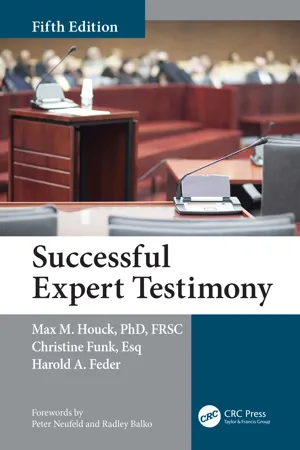
- 234 pages
- English
- ePUB (mobile friendly)
- Available on iOS & Android
Successful Expert Testimony
About this book
A major revision of the landmark book on expert testimony Feder's Succeeding as an Expert Witness, Successful Expert Testimony, Fifth Edition highlights the book's value to both attorneys and expert witnesses in promoting effective, impactful courtroom testimony. The book outlines the role of expert testimony in a trial, including explanations of methods, testing, and science, the legal process, and an overview of the roles of each player.
Succeeding as an expert witness requires a basic understanding of who and what experts are and what role they play in rendering their opinions within the courts. The new edition has been fully updated to present key information on the most vital topics, including the deposition, a discussion of false or unsupported testimony, adherence to scientific principles, and direct and cross-examination testimony of expert witnesses. Each chapter includes key terms, review questions, and thought-provoking discussion questions for further consideration of the topics addressed.
Given many high profile cases and increasing incidents of misconduct, this edition focuses heavily on the role of ethics in expert testimony and forensic practice. The full revised chapter on ethics, covers unethical conduct of forensic witnesses, admissibility of expert testimony, inter-professional relations, abuse of and by experts, and forensic professional codes of ethics.
Offering useful career insights and established trial-tested tips, forensic scientist Max M. Houck and attorney Christine Funk update renowned lawyer Harold A. Feder's classic book. Successful Expert Testimony, Fifth Edition serves as an ideal reference for forensic science students entering the work force—in labs and investigative positions—in addition to serving as a crucial resource for more experienced civil, private, and testifying experts in all disciplines.
Tools to learn more effectively

Saving Books

Keyword Search

Annotating Text

Listen to it instead
Information
Table of contents
- Cover
- Half Title
- Title Page
- Copyright Page
- Dedication
- Contents
- Foreword
- Foreword
- Authors
- 1. Expert Witnesses: An Overview
- 2. Methods, Testing, and Science
- 3. The Players
- 4. The Legal Context
- 5. Testimony
- 6. Direct Examination of Experts
- 7. The Visual Display of Information
- 8. Cross-Examination
- 9. Ethics
- Appendix A: Federal Rules of Evidence 701 through 706
- Appendix B: A Proposed Code of Conduct
- Appendix C: An Expert’s Bill of Rights
- Appendix D: Frye v. United States
- Appendix E: Daubert v. Merrell Dow Pharmaceuticals, Inc.
- Appendix F: Kumho Tire v. Carmichael
- Appendix G: General Electric Company v. Joiner
- Appendix H: Expert Testimony in the Wake of Daubert, Joiner, and Kumho Tire
- Appendix I: Resources for Private Experts
- Glossary and Important Terms
- Bibliography
- Index
Frequently asked questions
- Essential is ideal for learners and professionals who enjoy exploring a wide range of subjects. Access the Essential Library with 800,000+ trusted titles and best-sellers across business, personal growth, and the humanities. Includes unlimited reading time and Standard Read Aloud voice.
- Complete: Perfect for advanced learners and researchers needing full, unrestricted access. Unlock 1.4M+ books across hundreds of subjects, including academic and specialized titles. The Complete Plan also includes advanced features like Premium Read Aloud and Research Assistant.
Please note we cannot support devices running on iOS 13 and Android 7 or earlier. Learn more about using the app